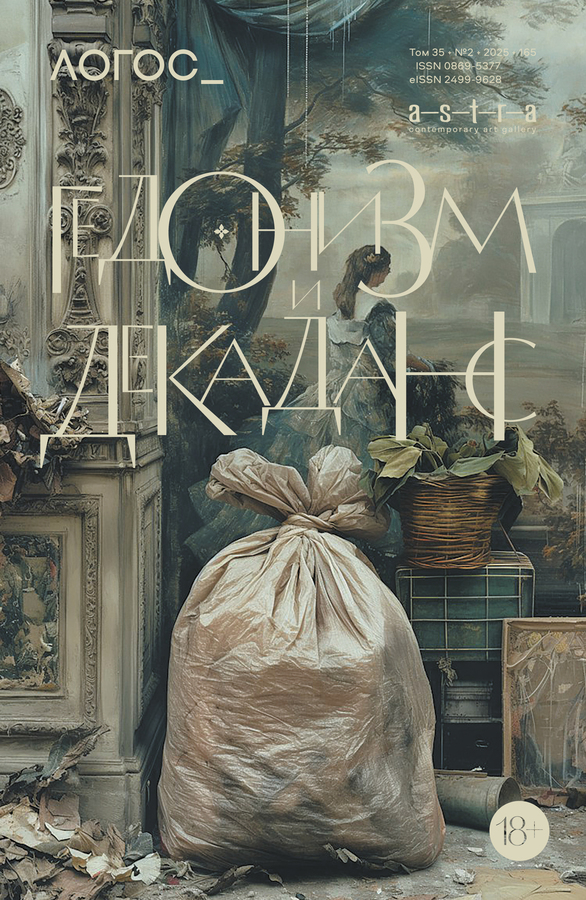The circulation of feelings in the Belle Epoque and the narrator’s gossip in Marcel Proust
- 作者: Mikirtumov I.1
-
隶属关系:
- National Research University Higher School of Economics (HSE University)
- 期: 卷 35, 编号 2 (2025)
- 页面: 143-170
- 栏目: DARK PLEASURE
- URL: https://journal-vniispk.ru/0869-5377/article/view/292782
- DOI: https://doi.org/10.17323/0869-5377-2025-2-143-168
- ID: 292782
如何引用文章
详细
The author examines the connection between the genre of gossip, an important device in Marcel Proust’s novel In Search of Lost Time, and the circulation of pleasures in the Belle Époque. The main features of this period are characterized in relation to the phenomenon of decadence, which is presented as a kind of design bureau where tastes and aesthetic standards were produced. During the Belle Époque, society underwent integration, there was an intensive cultural exchange in which, for four decades, high society, based on hereditary aristocracy, set the tone for all other strata. This determined the circulation of pleasures, which is compared to Karl Marx’s commodity fetishism. Decadence as such did not go beyond the sphere of social aesthetics.
In Proust’s novel, the narrator appears as a considerable gossip, which is connected to the need to realize the socio-critical function of the novel outside ideological certainty. For this, the writer needed to bring the lives of people comprising high society as close as possible, overcoming the fact that they are uninteresting and nothing happens to them. Instead of giving the narrative a “literary quality,” Proust, according to Fredric Jameson, turns it into “whispering.” This is achieved, firstly, through the reader’s pleasure, caused by the discourse of gossip, which has positive social functions. Secondly, the narrator in the novel, a melancholic and morbid person, reveals a plan of almost detective investigation in which the tension between past and present, imaginary and genuine, as well as between the novel’s material and narrative, is removed. The pleasure of talking about people who receive pleasure is transmitted to the narrator as well.
全文:
作者简介
Ivan Mikirtumov
National Research University Higher School of Economics (HSE University)
编辑信件的主要联系方式.
Email: imikirtumov@hse.ru
俄罗斯联邦, St. Petersburg
参考
- Albaret C. Gospodin Prust. Vospominaniia, zapisannye Zhorzhem Bel’monom [Monsieur Proust. Souvenirs recueillis par Georges Belmont], St. Petersburg, Modern, 2022.
- Aristotle. Nikomakhova etika [Nicomachean Ethics]. Sochineniia: V 4 tomakh [Works: In 4 Volumes], Moscow, Mysl’, 1983, vol. 4, pp. 53–294.
- Badiou A. The Democratic Emblem. In: Agamben G., Badiou A., Bensaïd D., Brown W., Nancy J.-L., Rancière J., Ross K., Zizek S. Democracy in What State? New York, Columbia University Press, 2011, pp. 1–15.
- Benjamin W. K portretu Prusta [Zum Bilde Prousts]. Ozareniia [Illuminationen], Moscow, Martis, 2000, pp. 301–312.
- Berdyaev N. Filosofiia svobody [The Philosophy of Freedom]. Filosofiia svobody. Smysl tvorchestva [The Philosophy of Freedom. The Meaning of the Creative Act], Moscow, Pravda, 1989, pp. 12–253.
- Buck-Morss S. Dialektika videniia: Val’ter Ben’iamin i proekt “Passazhei” [The Dialectics of Seeing. Walter Benjamin and the Arcades Project]. Versus, 2022, vol. 22, no. 4, pp. 172–200.
- Carnevali B. “Être, c’est être perçu”: Ce que Proust enseigne à la philosophie sociale. Le travail de la littérature. Usages du littéraire en philosophie (eds D. Lorenzini, A. Revel), Rennes, Presses Universitaires de Rennes, 2012, pp. 39–51.
- Deleuze G. Marsel’ Prust i znaki [Proust et les signes], St. Petersburg, Aletheia, 1999.
- Donadio R. France’s Obsession With Decline Is a Booming Industry. The New York Times, February 04, 2017, sec. C, p. 1. Available at: https://www.nytimes.com/2017/02/03/books/france-michel-onfray-decadence.html.
- Foucault M. Istoriia seksual’nosti. T. 2: Ispol’zovanie udovol’stvii [Histoire de la sexualité, t. II: L’usage des plaisirs], St. Petersburg, Akademicheskii proekt, 2004.
- Gluckman M. Spletni i zloslovie [Gossip and Scandal]. Social Sciences and Humanities. Domestic and Foreign Literature. Series 11: Sociology, 2000, pp. 117–144.
- Jameson F. The Modernist Papers, London, New York, Verso, 2007.
- Jameson F. Udovol’stvie: politicheskii vopros [Pleasure: A Political Issue]. Logos (Russia), 2015, vol. 25, no. 1, pp. 1–22.
- Lacan J. Nisproverzhenie sub”ekta i dialektika zhelaniia v bessoznatel’nom u Freida [Subversion du sujet et dialectique du désir dans l’inconscient freudien]. Instantsiia bukvy, ili sud’ba razuma posle Freida [L’instance de la lettre dans l’inconscient, ou la raison depuis Freud], Moscow, Russkoe fenomenologicheskoe obshchestvo, Logos, 1997, pp. 148–183.
- Lyotard J.-F. Libidinal’naia ekonomika [Économie libidinale], Moscow, St. Petersburg, Gaidar Institute Press, 2018.
- Marx K. Ekonomichesko-filosofskie rukopisi 1844 goda [Die Ökonomisch-philosophischen Manuskripte aus dem Jahre 1844]. In: Marx K., Engels F. Sochineniia: V 50 tomakh Izdanie 2-e [Works: In 50 volumes, 2nd edition], Moscow, Politizdat, 1974, vol. 42, pp. 41–174.
- Marx K. Kapital [Das Kapital], Moscow, Gospolitizdat, 1953.
- Panchenko D. Kogda zakonchilos’ Novoe vremia? [When Did the Early Modern Era End?]. Neprikosnovennyi zapas, 2009, no. 5, pp. 39–54.
- Panchenko D. Kul’turnyi rastsvet v Afinakh v V veke do n. e. v sravnitel’no-istoricheskom osveshchenii [Cultural Flourishing in 5th Century BC Athens in the Light of Comparative Studies]. Journal of Ancient History, 2012, no. 2, pp. 142–154.
- Philippe J. Prince of Aesthetes: Count Robert de Montesquiou, 1855–1921, New York, Viking Press, 1968.
- Proust M. V poiskakh utrachennogo vremeni. Roman sed’moi “Vremia, obretennoe vnov’”: tekst i kontekst [À la recherche du temps perdu. The Seventh Novel “Le Temps retrouvé”: Text and Context], St. Petersburg, Aletheia, 2020.
- Revel J.-F. O Pruste [Sur Proust], Moscow, Znak-SP, 1995.
- Schmid M. Proust dans la Décadence, Paris, Éditions Honoré Champion, 2008, pp. 21–22.
- Simmel G. Soziologie. Untersuchungen über die Formen der Vergesellschaftung, Leipzig, Duncker & Humbolt, 1908.
- Stern S. Wilde’s Obscenity Effect: Influence and Immorality in The Picture of Dorian Gray. The Review of English Studies, 2017, vol. 68, no. 286, pp. 756–772.
- Trykov V. Svetskie khroniki Marselia Prusta [Secular Chronicles of Marcel Proust]. New Philological Bulletin, 2021, no. 2 (57), pp. 312–321.
- Veselovsky A. Epokha chuvstvitel’nosti [The Age of Sensitivity]. Izbrannye stat’i [Selected Articles], Leningrad, Khudozhestvennaia literatura, 1939.
补充文件









